
Manufacturing company Illinois Tool Works (NYSE:ITW) fell short of the market’s revenue expectations in Q3 CY2024, with sales falling 1.6% year on year to $3.97 billion. Its GAAP profit of $3.91 per share was 55.1% above analysts’ consensus estimates.
Is now the time to buy Illinois Tool Works? Find out by accessing our full research report, it’s free.
Illinois Tool Works (ITW) Q3 CY2024 Highlights:
- Revenue: $3.97 billion vs analyst estimates of $4.02 billion (1.3% miss)
- EPS: $3.91 vs analyst estimates of $2.52 (55.1% beat, would have been $2.65 excluding a divestiture gain which still would have exceeded expectations)
- EPS (GAAP) guidance for the full year is $11.68 at the midpoint, beating analyst estimates by 13.6%
- Gross Margin (GAAP): 43.8%, up from 42.5% in the same quarter last year
- Operating Margin: 26.5%, in line with the same quarter last year
- Free Cash Flow Margin: 19.7%, down from 21.2% in the same quarter last year
- Organic Revenue fell 1% year on year (0.2% in the same quarter last year)
- Market Capitalization: $76.02 billion
“ITW delivered solid third quarter results, as our worldwide team continued to successfully navigate and overcome market challenges with strong operational execution as evidenced by operating margin of 26.5 percent, including 130 basis points contribution from enterprise initiatives, and EPS growth to $2.65 per share excluding a divesture gain,” said Christopher A. O’Herlihy, President and Chief Executive Officer.
Company Overview
Founded by Byron Smith, an investor who held over 100 patents, Illinois Tool Works (NYSE:ITW) manufactures engineered components and specialized equipment for numerous industries.
General Industrial Machinery
Automation that increases efficiency and connected equipment that collects analyzable data have been trending, creating new demand for general industrial machinery companies. Those who innovate and create digitized solutions can spur sales and speed up replacement cycles, but all general industrial machinery companies are still at the whim of economic cycles. Consumer spending and interest rates, for example, can greatly impact the industrial production that drives demand for these companies’ offerings.
Sales Growth
A company’s long-term performance can indicate its business quality. Any business can put up a good quarter or two, but many enduring ones grow for years. Over the last five years, Illinois Tool Works grew its sales at a sluggish 2.3% compounded annual growth rate. This shows it failed to expand in any major way, a rough starting point for our analysis.
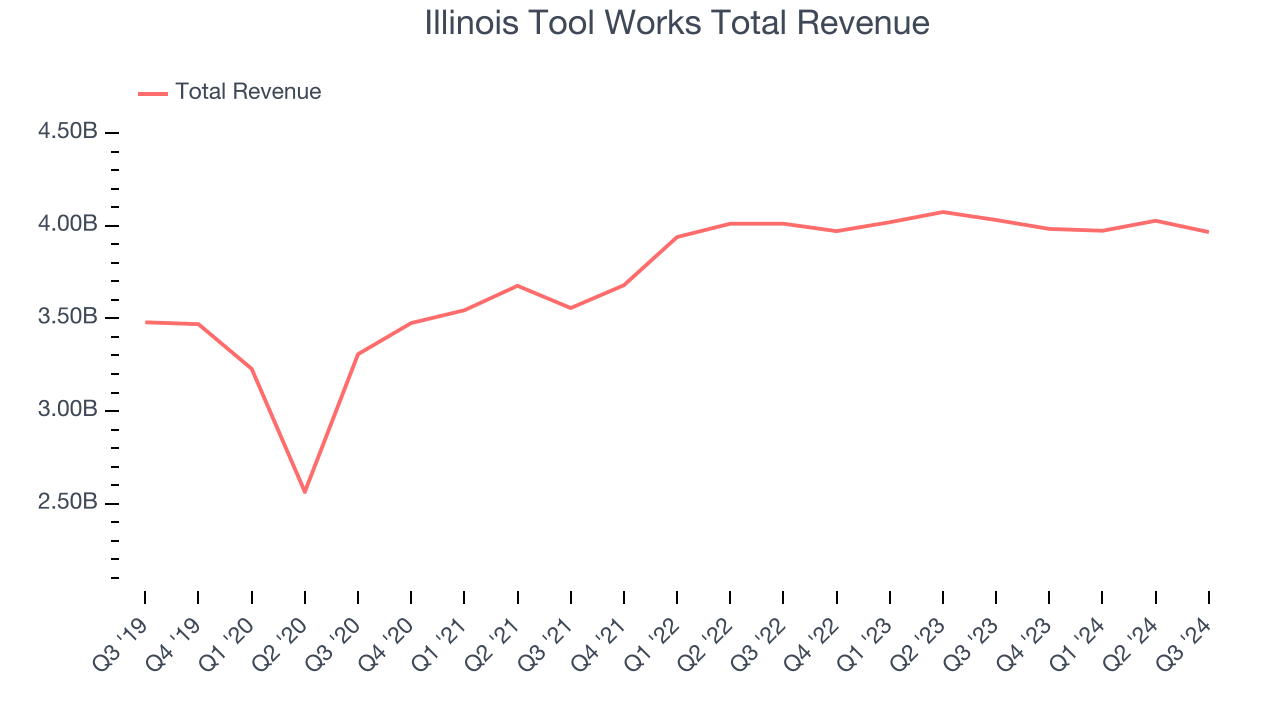
Long-term growth is the most important, but within industrials, a half-decade historical view may miss new industry trends or demand cycles. Illinois Tool Works’s recent history shows its demand slowed as its revenue was flat over the last two years. 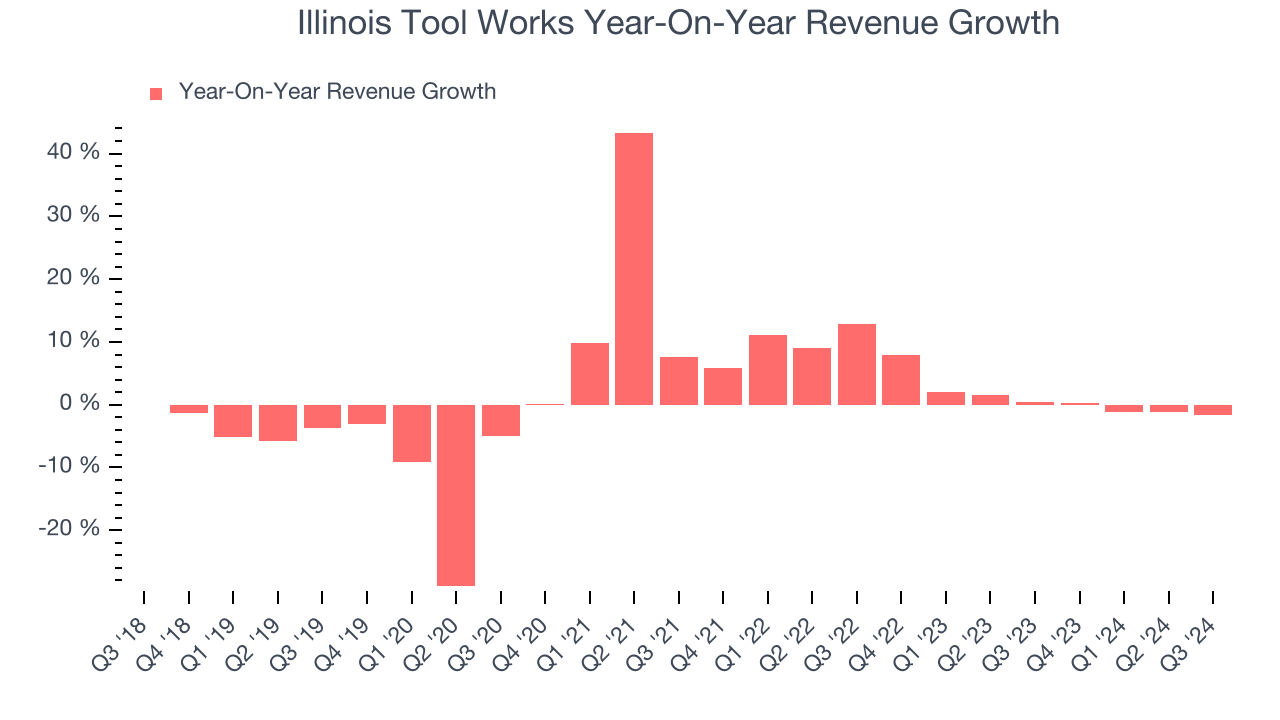
We can dig further into the company’s sales dynamics by analyzing its organic revenue, which strips out one-time events like acquisitions and currency fluctuations because they don’t accurately reflect its fundamentals. Over the last two years, Illinois Tool Works’s organic revenue averaged 2.3% year-on-year growth. Because this number aligns with its normal revenue growth, we can see the company’s core operations (not M&A) drove most of its performance. 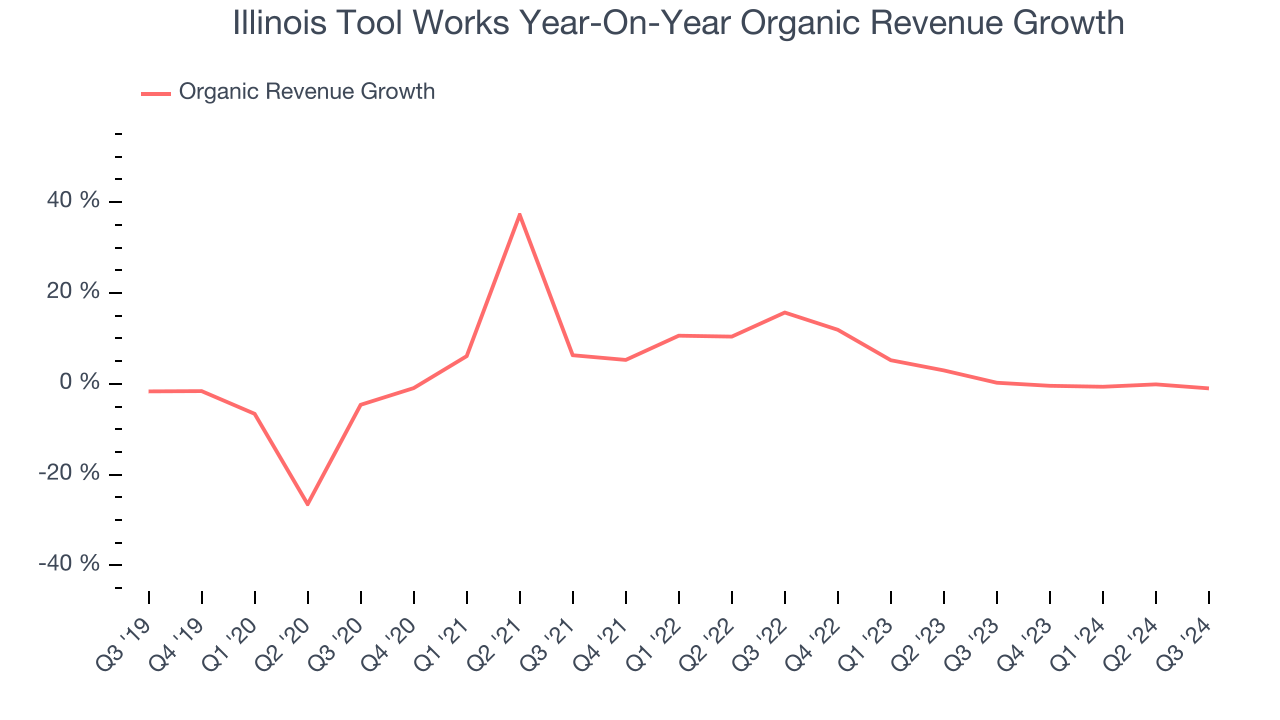
This quarter, Illinois Tool Works missed Wall Street’s estimates and reported a rather uninspiring 1.6% year-on-year revenue decline, generating $3.97 billion of revenue.
Looking ahead, sell-side analysts expect revenue to grow 2.7% over the next 12 months. While this projection illustrates the market believes its newer products and services will catalyze better performance, it is still below the sector average.
Unless you’ve been living under a rock, it should be obvious by now that generative AI is going to have a huge impact on how large corporations do business. While Nvidia and AMD are trading close to all-time highs, we prefer a lesser-known (but still profitable) semiconductor stock benefitting from the rise of AI. Click here to access our free report on our favorite semiconductor growth story.
Operating Margin
Operating margin is a key measure of profitability. Think of it as net income–the bottom line–excluding the impact of taxes and interest on debt, which are less connected to business fundamentals.
Illinois Tool Works has been a well-oiled machine over the last five years. It demonstrated elite profitability for an industrials business, boasting an average operating margin of 24.5%. This result isn’t surprising as its high gross margin gives it a favorable starting point.
Analyzing the trend in its profitability, Illinois Tool Works’s annual operating margin rose by 4 percentage points over the last five years, showing its efficiency has improved.
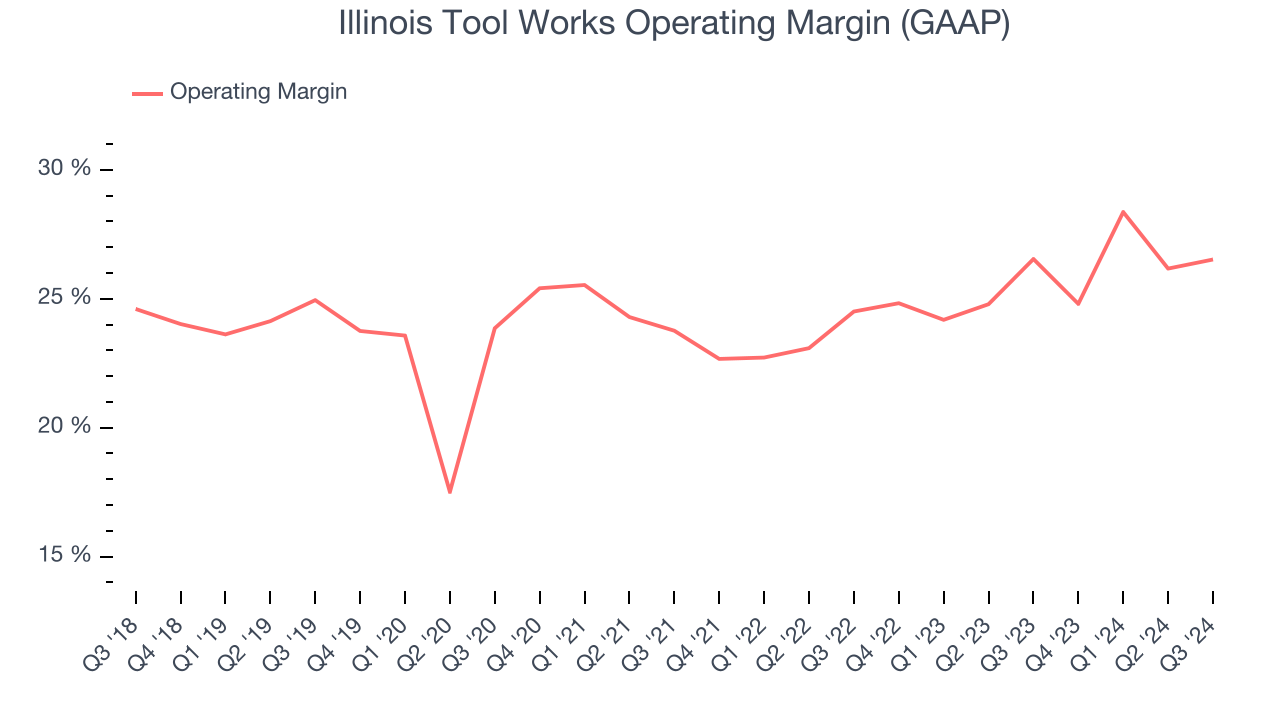
This quarter, Illinois Tool Works generated an operating profit margin of 26.5%, in line with the same quarter last year. This indicates the company’s cost structure has recently been stable.
Earnings Per Share
Analyzing revenue trends tells us about a company’s historical growth, but the long-term change in its earnings per share (EPS) points to the profitability of that growth – for example, a company could inflate its sales through excessive spending on advertising and promotions.
Illinois Tool Works’s EPS grew at a decent 8.8% compounded annual growth rate over the last five years, higher than its 2.3% annualized revenue growth. This tells us the company became more profitable as it expanded.
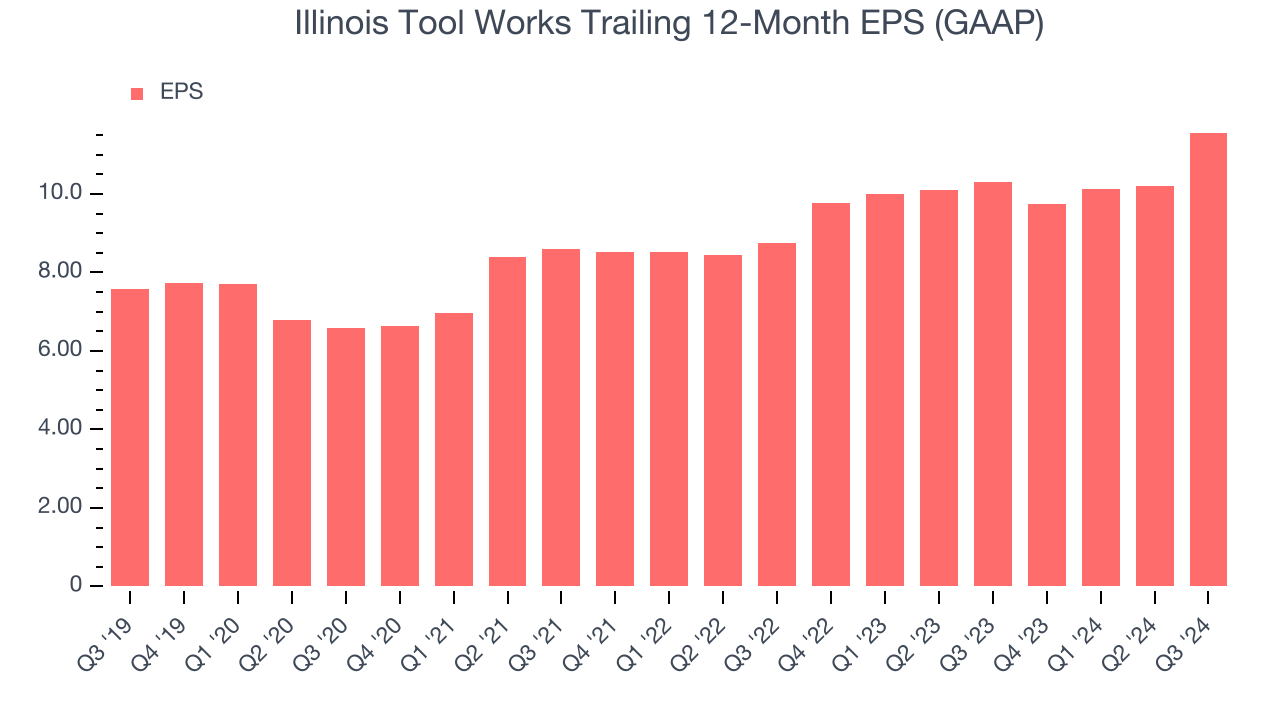
We can take a deeper look into Illinois Tool Works’s earnings quality to better understand the drivers of its performance. As we mentioned earlier, Illinois Tool Works’s operating margin was flat this quarter but expanded by 4 percentage points over the last five years. On top of that, its share count shrank by 8.3%. These are positive signs for shareholders because improving profitability and share buybacks turbocharge EPS growth relative to revenue growth. 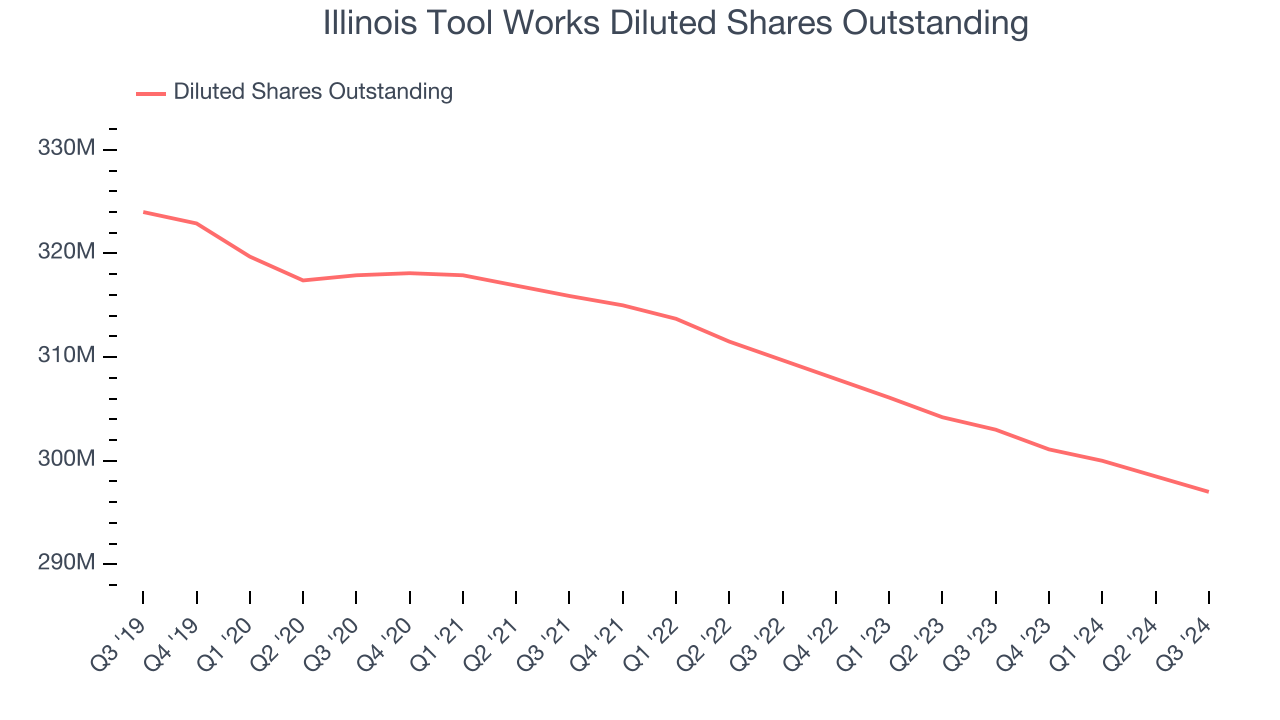
Like with revenue, we analyze EPS over a more recent period because it can give insight into an emerging theme or development for the business.
For Illinois Tool Works, its two-year annual EPS growth of 14.9% was higher than its five-year trend. This acceleration made it one of the faster-growing industrials companies in recent history.In Q3, Illinois Tool Works reported EPS at $3.91, up from $2.55 in the same quarter last year. This print easily cleared analysts’ estimates, and shareholders should be content with the results. Over the next 12 months, Wall Street expects Illinois Tool Works’s full-year EPS of $11.56 to shrink by 9.1%.
Key Takeaways from Illinois Tool Works’s Q3 Results
We liked that Illinois Tool Works beat analysts’ EPS expectations this quarter, even excluding the divestiture gain which is a non-recurring item. We were also glad its full-year EPS guidance exceeded Wall Street’s estimates. On the other hand, its revenue unfortunately missed and its organic revenue fell short Wall Street’s estimates. Overall, this quarter was mixed. The stock remained flat at $254 immediately following the results.
So do we think Illinois Tool Works is an attractive buy at the current price?We think that the latest quarter is only one piece of the longer-term business quality puzzle. Quality, when combined with valuation, can help determine if the stock is a buy. We cover that in our actionable full research report which you can read here, it’s free.